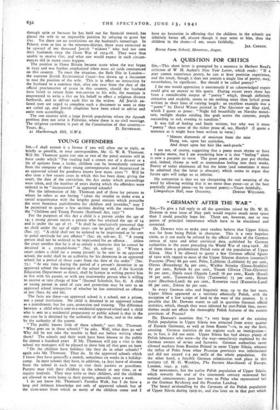YOUNG OFFENDERS
SIR,—I shall esteem it a favour if you will allow me to reply, as briefly as possible, to your correspondent, Mr. G. W. R. Thomson. Will Mr. Thomson quote just one or two of the penal statutes still in force under which " For stealing half a crown out of a drawer or a tin of apricots from a larder, children can be immediately removed from the company of their young contemporaries and incarcerated in an approved school for goodness knows how mans years "? Will he also state a few recent cases in which this has been done, giving the court, the date of the conviction, the Act under which proceedings were taken, and the number of years during which the offenders were ordered to be " incarcerated " in approved schools?
For the information of Mr. Thomson and of those lay persons to whom he refers as not having " taken the trouble to make even a casual acquaintance with the lengthy penal statutes which prescribe the most ferocious punishments for children and juveniles," may I be permitted to quote a few sections dealing with the matter from the " Children and Young Persons (Scotland) Act, 1937 "?
For the purposes of this Act a child is a person under the age of 14; a young person means a person who has attained the age of 14 and is under the age of 57. " It shall be conclusively presumed that no child under the age of eight years can be guilty of any offence " (Sec. 55). " A child shall not be ordered to be imprisoned or be sent to penal servitude for any offence " (Sec. 56, sub-sec. I). " A young person shall not be ordered to be imprisoned for an offence . . unless the court certifies that he is of so unruly a character that he cannot be detained in a remand-home " (Sec. 56, sub-sec 3). " Where a court orders a child (or a young person) to be sent to an approved school, the order shall be an authority for his detention in an approved school for a period of three years from the date of the order." (Sec. 75.) " At any time during the period of a person's detention in an approved school the managers of the school may and, if the Scottish Education Department so direct, shall by licence in writing permit him to live with his parent, or with any trustworthy person who is willing to receive or take charge of him " (Second Schedule, Sec. 6). A child or young person in need of care and protection may be sent to an approved school irrespective of whether he has committed an offence or not (Secs. 65 and 66).
The facts are these—an approved school is a school, not a prison, nor a penal institution. No child is detained in an approved school as a punishment, but for care, protection and training. The difference between a child who is sent to a residential approved school and a child who is sent to a residential preparatory or public school is that in the one case he is detained by the authority of the State, and in the other by the authority of the parent.
" The public knows little of these schools," says Mr. Thomson. " What goes on in these schools? " he asks. Well, what does go on? Why did he not take the trouble to find out before writing about them? The schools and their work have been known to the public for almost a hundred years If Mr. Thomson will pay a visit to this school my managers will be pleased to show him all that goes on here.
" Do the children have holidays like they do in other schools? " again asks Mr. Thomson. They do. In the approved schools which I know they have generally a month, sometimes six weeks in a holiday- camp. In most schools they have, in addition, t4 days leave of absence from the school in each year to visit their parents or guardians. Parents may visit their children in the schools at any time, or at regular intervals. They may write to their children, and the children are allowed to write home to their parents, generally once a week.
I do not know Mr. Thomson's Paradise Walk, but I do have a long and intimate knowledge not only of approved schools but of the slum-areas from which so many of the children come and I
have no hesitation in affirming that the children in the schools are infinitely better off, absurd though it may seem to him, than the children in the slums.—I am, yours faithfully, Rossie Farm School, Montrose, Angus.
JAS. CARSON.


























 Previous page
Previous page